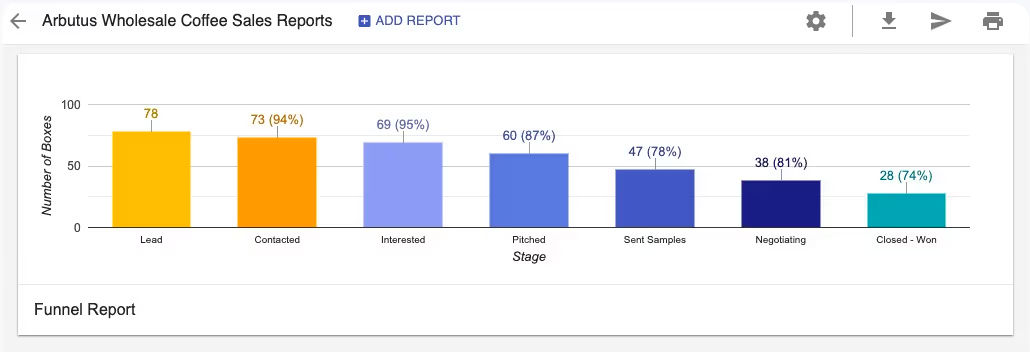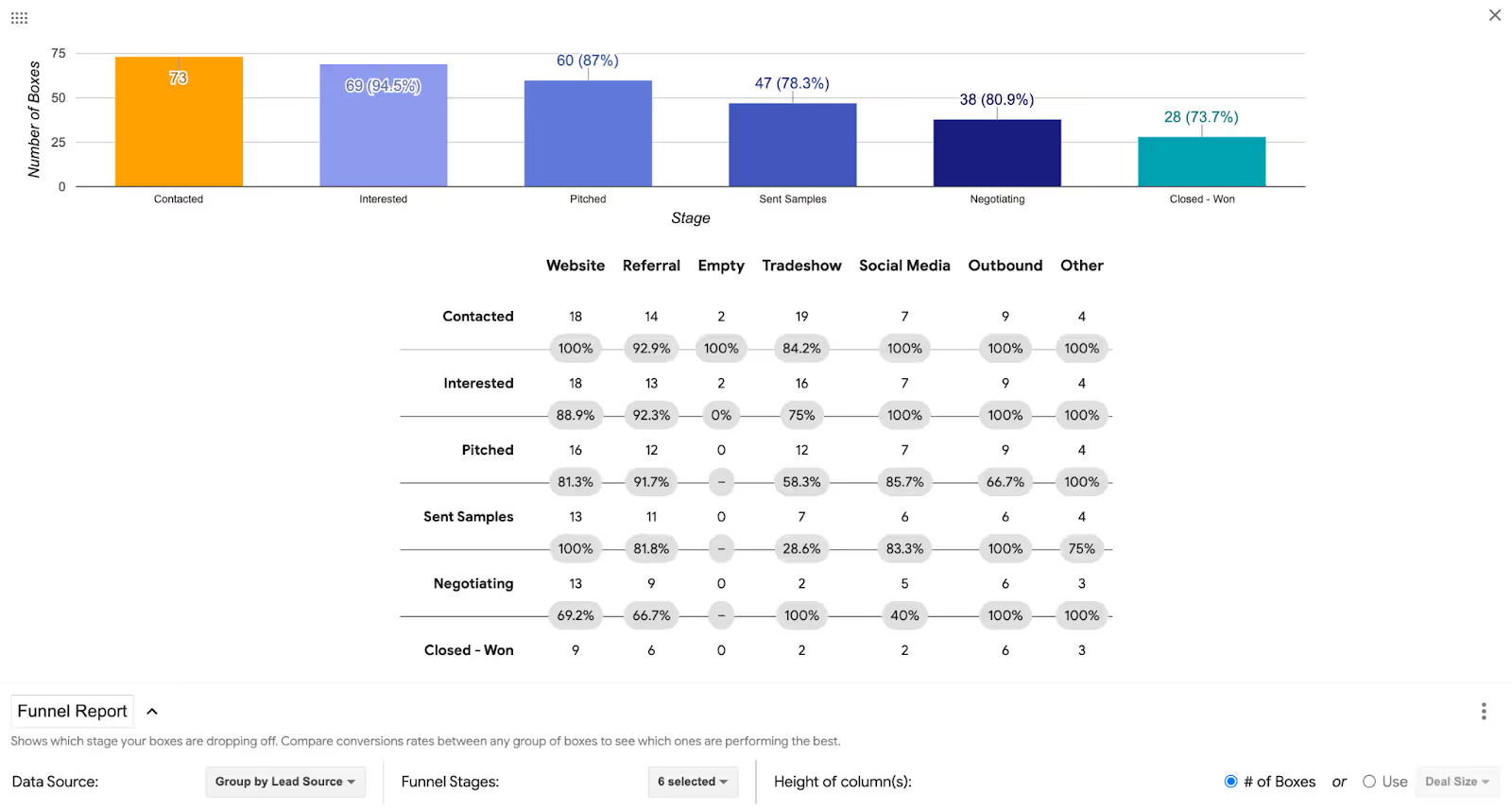The 105 most common sales terms explained
New to sales? You’ll need to know this jargon. Here are 105 of the most common sales terms and acronyms in the industry.
Effective sales coaching helps sales reps keep their eye on the ball and continuously strive for improvement. According to Gartner, coaching can increase sales by 8 percent, so it pays off in a tangible way. However, the same study revealed that only 40 percent of salespeople are working in a well-established coaching environment.
Here’s what we think at Streak: all types of sales reps, whether they're brand new or a seasoned sales veteran, can benefit from coaching. If you're a sales manager, and you’re hesitant about the time commitment, know that the upside potential is worth every second.
In this article, we'll cover sales coaching best practices and give you a few techniques to build a coaching program. We'll also cover how Streak can help you put your coaching strategies into action. Let’s dive in.
Salespeople have a common goal: to close deals. But the way they get there will vary drastically depending on their personality, the type of product they’re selling, and the type of customer they’re serving. Sales coaching is what happens when a sales leader studies a seller’s habits and patterns and shares what they’ve observed to help them shore up their strengths and work on their weaknesses. Often sales managers or revenue enablement leaders will have one-on-one coaching sessions with their direct reports on either a weekly or monthly basis.
Unlike a group training session, sales coaching usually dives deep into the individual attributes and challenges of each salesperson. A great sales coach isn’t condescending or a know-it-all, but rather someone who helps each teammate develop skills and strategies that are unique and beneficial to them.
Note: The best coaching is always built upon a foundation of trust and open dialogue. When that solid base is there, sales coaches become trusted confidants and strategists in getting deals across the finish line.
{{cta-box}}
Sales management is the tactical framework that covers setting objectives, allocating resources, and orchestrating a sales force's actions to align with the business strategy.
On the other hand, sales coaching zeroes in on the individual development of sales personnel. Through targeted guidance and mentorship, a good sales coach nurtures the competencies and tactical skills of each sales rep. This personalized attention can directly influence a salesperson's ability to convert leads and close deals.
Sales managers and coaches are both important, and one person might wear both hats. But typically sales managers provide the strategic blueprint, and sales coaches track individual performance and progress. Together, they help sales teams understand the company's goals and gain the skills to achieve them.
Plain and simple, a sales coach monitors a sales rep's progress and identifies areas for improvement. Great coaches analyze key metrics, like deals won and average deal size. Through the data, they can often pinpoint specific weaknesses or bottlenecks in the sales process.
But it's not all about the numbers. Much of sales is an interpersonal experience as two parties negotiate. Coaches study how their teams of reps handle and overcome objections, sometimes even in real time. After that, they’ll host sales training sessions, offer personalized feedback, and share tools and resources for moving that deal forward.
If you’re reading this as a sales coach, remember that throughout the coaching process, you should have empathy with every sales rep and seek to bring out the best in them. If they feel like they're failing all the time, they won't stick around long.
There are dozens of benefits to sales coaching, but here are just a few benefits of a coaching plan:
The fees for a sales coach vary greatly. There’s everything from online courses by companies like Hubspot and professionals on Coursera, to in-demand coaches that charge $10,000 or more. If you're working with a smaller budget, you can find an online coach who can give video sessions for an hourly fee.
Look at the course or coach's credentials, and consider how much your team can benefit. For increased sales performance and revenue down the road, it’s likely worth it to pay for a professional coach.
Next, we'll cover some popular sales coaching strategies. Here’s what some of the top sales coaches do:
Any serious athlete reviews game tape with their coach. The same is true for serious sales reps. A good sales coaching program should include call reviews so reps can study how they performed in the real world. From there, a coach can guide them through thoughtful reflection and actionable feedback.
If you’re a sales coach, get your team in the habit of listening to their own sales interactions. They'll uncover both weaknesses that require attention and successful tactics that should be adopted more broadly.
Self-evaluation is fundamental. It allows reps to critically reflect on their performance. While reviewing calls is one type of self-evaluation, coaches can expand on that by having reps reflect on how they hit their goals last quarter and identify what things hindered their performance.
A monthly self-evaluation is a good rhythm that can keep each rep’s eyes on the bigger picture.
Below are some example questions to ask:
An effective sales coach understands that consistent sales results come from the combination of careful planning and precise execution. Every rep should have explicit and attainable sales objectives in their sales coaching plan.
The action plan outlines what reps should do to get to their goals. For newer reps, coaches will create a plan and walk them through it, but for more seasoned sales professionals, coaches will often collaborate on action plans related to their deals. The goal of an action plan is to keep reps making strategic decisions with their time and sales practices rather than wasting energy on sales activities that don’t progress deals.
In the same vein as action plans, involving sales reps in the goal-setting process is always wise as a sales coach. This allows reps to claim ownership over their growth. It taps into the intrinsic motivation of each rep as they align their personal ambitions with the company's objectives.
Plus, giving reps some flexibility over how they reach their goals empowers them to get creative and continuously improve. To help them get into the goal-setting mindset, ask open-ended questions.
For example, instead of asking about meeting the quota, you could ask about different approaches they take with prospects.
This approach enables them to independently find solutions rather than relying on instructions.
If you’re a sales manager or leader, your influence extends well beyond routine sales instruction. It’s up to you to cultivate a sales culture that's in harmony with the broader objectives of the company and communicate those objectives often in coaching sessions. That’s what big-picture coaching is about. You’ll likely find yourself responding to these questions in an actions-speak-louder-than-words kind of way:
On the opposite end of big-picture sales coaching is in-the-weeds, tactical coaching. This is where it gets granular. Here are a few questions sales coaches with this style might ask in a session:
This type of coaching concentrates on practical strategies and specific behaviors.
Here, top sales coaches dissect the sales cycle, identify core skills for each phase, and then coach each rep based on what’s needed in each deal stage. For example, a sales rep focused on lead generation might need to develop skills in prospecting and initial contact techniques. Maybe they have great cold emails but aren't following up as well.
On the other hand, reps closing deals should be skilled in negotiation and closing tactics. Perhaps they close deals consistently with prospects who are in a certain role or industry, but struggle with those outside of that safety zone. Great sales coaches notice these kinds of patterns and share ways to improve during one-on-ones.
Whether you dedicate 20 percent of your time to coaching sessions or pay for an outside coach, you want to know if sales coaching improves sales performance. To accurately gauge the impact of sales coaching, it's important to define specific objectives that align with the broader goals of the sales department.
By tracking sales key performance indicators (KPIs) like the average deal size or the conversion rate before and after coaching, you can see if it works.
Effective coaching should lead to a few positive outcomes:
Sales teams love using Streak to track performance and quickly view detailed metrics about every deal in the pipe. At its core, Streak is a simple CRM for Gmail with full functionality for analyzing performance across the funnel.

That’s why we recommend using funnel reports in the sales coaching process to spot areas where sales reps can improve. Here are four tough tasks that these reports make look easy:
It’s easy to visualize where leads are dropping off in the sales pipeline with Streak. By analyzing these funnel reports, you can identify specific stages where sales reps might be struggling to keep leads warm. This intel equips sales coaches to notice and act on these bottlenecks, whether their reps need a hand with initial interactions, follow-ups, or actually closing deals.

Coaches can get quick, easy insight into which lead sources generate the most conversions. From there, they can coach their sales reps to focus on leads that come from the most promising places.
By tracking changing conversion rates over time, coaches can measure the impact of their coaching strategies. If there’s an improvement in conversion rates following specific coaching, it's a good indicator that coaching efforts are paying off.
Coaches can use Streak's customizable reports to pull specific, targeted data for each rep they partner with. For example, a coach could compare conversion rates between different reps or lead sources, choose which stages to include in their analysis, and decide how to present the data to the team or a specific individual.
No matter your sales coaching methodology, you definitely should analyze your impact. As you can see, Streak makes it easy and empowers reps and coaches alike to track how well their sales coaching is working, all in real time. Try Streak for free, and test out funnel reports for yourself. (Plus, it only takes 30 seconds to get started!)
Improvement starts with insights. Start tracking your sales leads with pipelines in Gmail to get funnel reports and actionable insights. Try it free for 14 days.